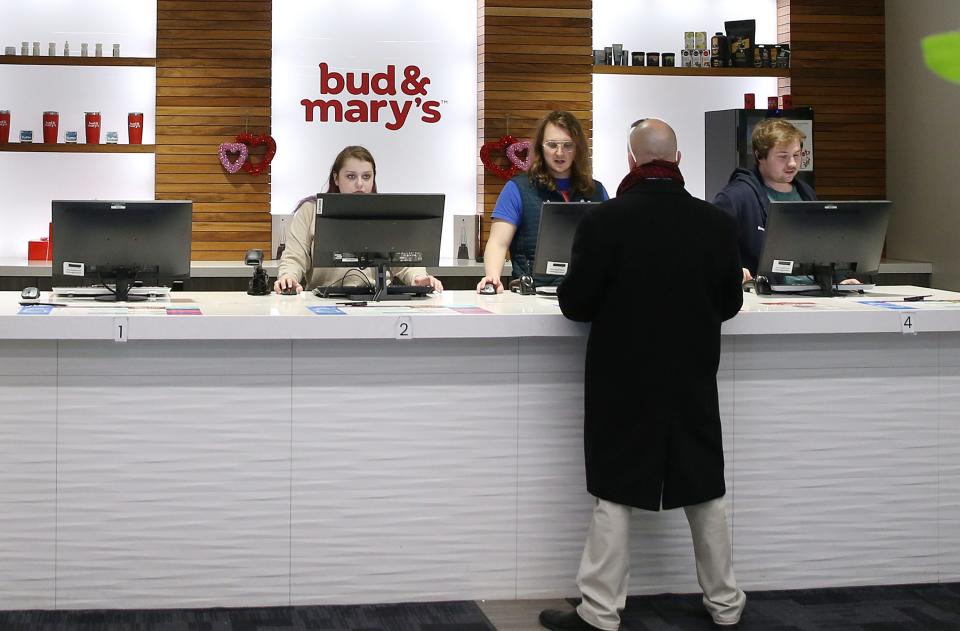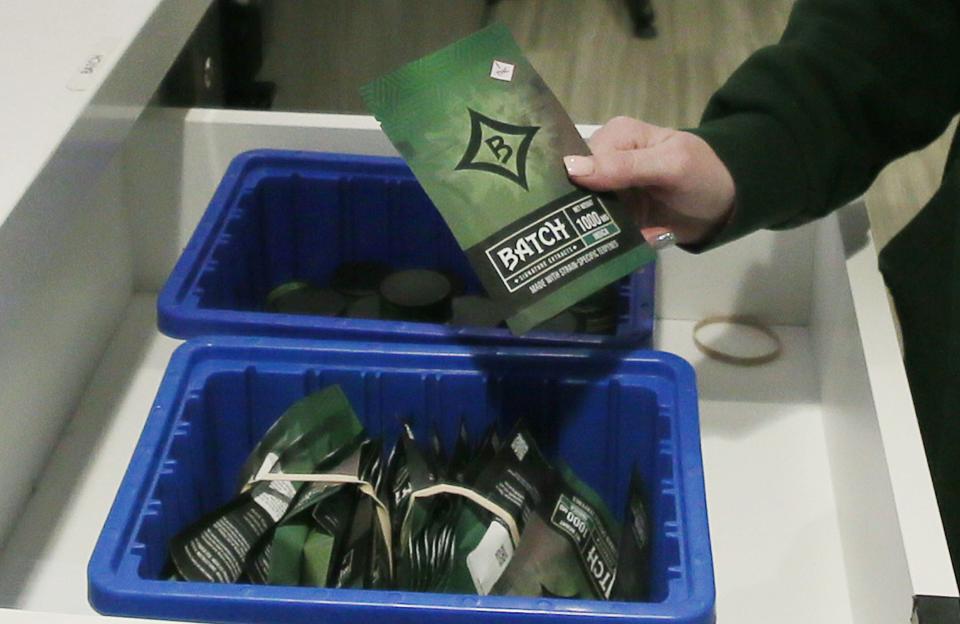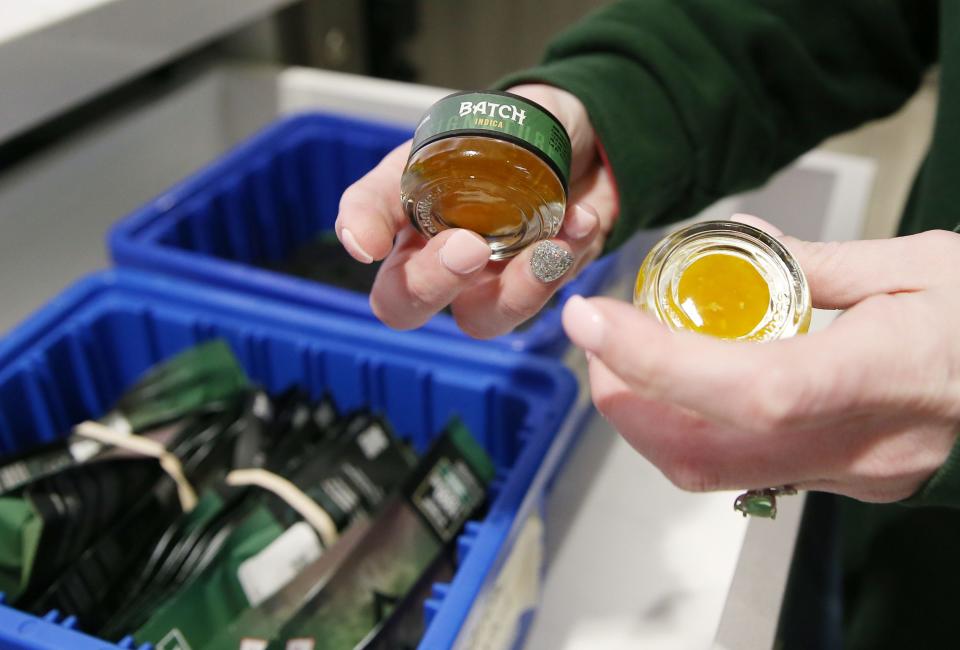Is Iowa's medical marijuana industry growing too fast? Why the state may put on the brakes
The state board overseeing Iowa's medical marijuana program has again asked Iowa lawmakers to legislate more oversight on telehealth providers participating in the program, among a number of other policy recommendations.
The request comes several months after the Iowa Medical Cannabidiol Board raised concerns that these virtual health care providers play a role in the rise of waivers on the program's purchasing limits on THC, or the main psychoactive component in marijuana that gives users a "high."

It also comes as board members continue to express larger concerns about entities within the program working to find loopholes within the strict guidelines to allow for broader use.
“Iowa’s program was designed to be limited, controlled and rational with evidence-based medicine,” said Dr. Robert Shreck, a member of the Medical Cannabidiol Board and a retired oncologist. "My personal and professional objection to the way things are going has to do with euphoria. You do not need to become stoned to get the medical benefits of cannabis.”
The state board has released its 2023 annual report, which includes policy recommendations to the Iowa Legislature and data on the Iowa Medical Cannabidiol Program's use over the past year.
Some policy recommendations — including the requests to implement more oversight on telehealth providers, remove sales tax for medical cannabidiol purchases and increase the number of medical dispensaries in Iowa — have been made in previous years by the state board. However, lawmakers at the Capitol have not taken up those recommendations.
In the report, the board expresses concerns about telehealth providers "who may not be maintaining patient-provider relationships with patients they are certifying, or do not establish care with patients in the traditional sense." Board members recommended a change to Iowa law to establish "rules around standards of practice for telemedicine."
“When the law was originally passed back in 2017, telehealth was not on the table," Shreck said. "To get a card you had to go visit your doctor and see your doctor, but when the pandemic hit, telehealth becomes the deal.”
Officials with Bud and Mary's, the sole manufacturer for Iowa's Medical Cannabidiol Program, pointed out that there have been regulatory rules in place for virtual providers for some time.
“The board is correct that standards for telehealth are important in the medical cannabis program, which is why there have been administrative rules in place since 2018 governing this practice. We continue to support those standards," said Lucas Nelson, group president of Bud & Mary’s.

More: Iowa's medical marijuana program is growing as THC waivers soar. Is it leading to abuse?
Telehealth concerns linked to spike in THC waivers
Between 2021 and 2022, Iowa saw a major increase in the number of patients who have received a waiver to the THC purchasing limit, which is capped at 4.5 grams of THC every 90 days. Nearly 16% of active patients in the program had a THC waiver in November 2022, compared with 8% in December 2021.
The report does not include 2023 totals on patients with THC waivers.
Board members have raised alarms over this increase, which they believe is tied to telehealth providers. Shreck pushed back on advocates' argument that telehealth providers help address accessibility issues for some Iowans, saying that has enabled some Iowans to abuse the program's limits.
“Why would someone go online? There are reasons I’m sure, but why would a patient go online to get a card and pay $100 or $200 out of pocket, when they could go to their real doctor, assuming they have one, without any additional charge except a $15 copay," he said. "Well, there must be some people who tried that and their doctor said no.”
The 2023 report does not disclose how many telehealth providers are participating in the state program.
In January 2023, state data provided to the Register showed only 13 providers were certifying patients for the program via telemedicine. In addition, there are "many" providers who certify patients through a combination of in-person and telehealth consultations, HHS officials said.
In all, the program had about 1,900 total health care practitioners participating in the program at that time.
Most patients are seeking THC waivers for chronic pain, the 2023 report shows. And a plurality of patients — about 30% — are purchasing high-dose THC products after participating in the program for more than a year.
The report does show most patients with a THC waiver typically purchase 4.6 grams to 18 grams. State officials said in the report that "data indicates that regardless of what dose a patient’s waiver may be for, they are purchasing well below their limit. Indeed, some patients with waivers have made no purchases at all."
Report: Iowa's program saw $13 million in total sales in 2023
The state's Medical Cannabidiol Program saw another year of growth in patient and provider participation in 2023, resulting in more than $13 million in total sales last year.
In all, the program saw $13.6 million in cumulative sales across Iowa's five dispensaries throughout 2023, a 24% increase from the $10.2 million in 2022. Sales surpassed $1 million every month in 2023.

As of November 2023, more than 2,200 health care providers were certifying patients for the medical cannabidiol program. Providers include doctors, nurse practitioners, physician assistants and podiatrists.
Hundreds of patients obtained cards from December 2022 to November 2023, with the total number of active cardholders rising from about 14,400 to more than 18,000 individuals. That's compared to the roughly 7,800 patients who were enrolled in the program in December 2021.
The program also saw a slight rise in the number of cards to designated caregivers, who are individuals certified to purchase and possess medical cannabis on behalf of a patient. The program had about 3,700 active caregiver cardholders as of November 2023, according to the report. That's compared with 3,100 in December 2022.
The five counties where dispensaries are located (Polk, Johnson, Linn, Black Hawk and Woodbury) are also the counties with the most cardholders.
However, state data shows less than half of cardholders renewed their card at the one-year expiration. In December 2023, only 43% of patients renewed their card.
That's a decline compared to January of that year, when 56% of patients renewed their medical cannabidiol card.
Advocates have long complained that the medical program is too restrictive and have pointed out it is likely contributing to a number of individuals opting to drive to nearby states to utilize their recreational marijuana programs.

Cost may also be a factor in Iowans' level of participation, especially since the prevalence of hemp businesses across the state has allowed individuals to access a broader array of similar products at a reduced price.
The average price for each purchase at the dispensaries was a little more than $120 in November 2023. That's a decrease from the $132 in December 2022.
“The most important thing we can do for Iowa patients is lower cost," Nelson said in a statement. "We interact with patients every day, and we consistently hear that cost is the biggest issue facing those Iowans."
Michaela Ramm covers health care for the Des Moines Register. She can be reached at mramm@registermedia.com, at (319) 339-7354 or on Twitter at @Michaela_Ramm
This article originally appeared on Des Moines Register: Iowa medical marijuana board wants more oversight for telehealth

